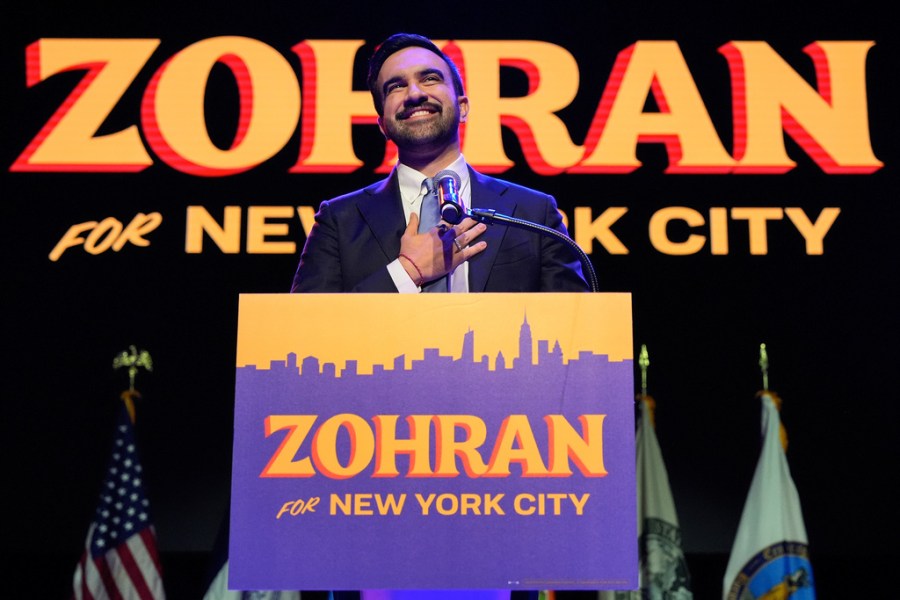Politics
New York’s Rent Freeze Proposal Faces Economic Backlash

New York City’s Mayor-elect, Zohran Mamdani, has unveiled a controversial proposal aimed at addressing the city’s housing crisis. He has called for a rent freeze alongside plans to construct 200,000 units of subsidized affordable housing. This initiative, however, faces significant criticism from economists who argue that it could worsen the existing housing challenges.
The mayor-elect’s proposal is framed as a response to skyrocketing rental prices that have left many residents struggling to find affordable housing options. Mamdani contends that the rent freeze is necessary to protect vulnerable tenants from rising costs. He aims to create a more sustainable housing market by increasing the availability of affordable units.
Despite the intentions behind the proposal, some experts caution that such measures could lead to unintended consequences. Economists have pointed out that implementing a rent freeze may deter new investment in housing developments. They argue that without the incentive for developers to build new properties, the city’s housing supply could shrink even further, exacerbating the very problems Mamdani seeks to solve.
Economic Implications of Rent Control
Critics of rent control policies often highlight a paradox: while they aim to make housing more affordable, they can result in decreased availability of rental units. According to the New York Times, similar policies in the past have led to landlords opting to convert rental units to condominiums or other uses, reducing the overall number of affordable options.
Additionally, some economists suggest that freezing rents may encourage tenants to remain in properties longer than they should, reducing turnover and limiting opportunities for new renters. This stagnation can create a mismatch between housing supply and demand, making it more challenging for those in need of affordable housing to find suitable options.
Mamdani’s administration argues that the creation of 200,000 subsidized units will offset potential negative impacts from the rent freeze. However, the timeline and funding for these projects remain unclear. Critics emphasize the importance of a balanced approach that considers both immediate tenant protections and long-term housing market health.
Public Reaction and Future Prospects
Public opinion on the proposal is mixed. Many residents welcome the idea of a rent freeze as a much-needed relief in a city where housing costs have consistently outpaced wage growth. On the other hand, real estate professionals and some economic analysts express concern that the plan could disincentivize development and worsen the housing shortage.
As New York City grapples with these challenges, the effectiveness of Mamdani’s proposals will likely depend on how well they can navigate the complex interplay of tenant protections, developer incentives, and overall market dynamics. The coming months will reveal whether the proposed measures can strike the right balance or if they will deepen the city’s housing woes.
In conclusion, while the vision of affordable housing is appealing, the path to achieving it is fraught with economic complexities. As the city prepares to implement these policies, stakeholders from all sides will be watching closely to gauge their impact.
-

 Business2 weeks ago
Business2 weeks agoForeign Inflows into Japan Stocks Surge to ¥1.34 Trillion
-

 Top Stories3 weeks ago
Top Stories3 weeks agoMarc Buoniconti’s Legacy: 40 Years Later, Lives Transformed
-

 Health3 weeks ago
Health3 weeks agoInnovative Surgery Restores Confidence for Breast Cancer Patients
-

 Sports1 month ago
Sports1 month agoSteve Kerr Supports Jonathan Kuminga After Ejection in Preseason Game
-

 Top Stories3 weeks ago
Top Stories3 weeks agoBOYNEXTDOOR’s Jaehyun Faces Backlash Amid BTS-TWICE Controversy
-

 Science2 weeks ago
Science2 weeks agoUniversity of Hawaiʻi Joins $25.6M AI Project to Monitor Disasters
-

 Science1 month ago
Science1 month agoChicago’s Viral ‘Rat Hole’ Likely Created by Squirrel, Study Reveals
-

 Entertainment1 month ago
Entertainment1 month agoZoe Saldana Advocates for James Cameron’s Avatar Documentary
-

 Lifestyle1 month ago
Lifestyle1 month agoKelsea Ballerini Launches ‘Burn the Baggage’ Candle with Ranger Station
-

 Top Stories3 weeks ago
Top Stories3 weeks agoCarson Wentz Out for Season After Shoulder Surgery: Urgent Update
-

 Politics1 month ago
Politics1 month agoDallin H. Oaks Assumes Leadership of Latter-day Saints Church
-

 Lifestyle1 month ago
Lifestyle1 month agoDua Lipa Celebrates Passing GCSE Spanish During World Tour









